- Home
- A. S. Byatt
Elementals: Stories of Fire and Ice Page 6
Elementals: Stories of Fire and Ice Read online
Page 6
‘It is only two litres. It is perfectly safe. Everyone has it in his pool, M. Bernard. It is tried and tested, it is a product for purifying water.’ It is only you, his pleasant voice implied, who is pigheaded enough to insist on voiding it.
The pool became a pit. The mosaic sparkled a little in the sun, but it was a sad sight. It was a deep blue pit of an entirely unproblematic dull texture. Almost like a bathroom floor. The dolphin lost his movement and his fire, and his curvetting ripples, and became a stolid fish in two dimensions. Bernard peered in from the deep end and from the shallow end, and looked over the terrace wall at the hillside where froth was expiring on nettles and brambles. It took almost all day to empty and began to make sounds like a gigantic version of the bath-plug terrors of Bernard’s infant dreams.
The two young men appeared carrying an immense boa-constrictor of heavy black plastic pipe, and an implement that looked like a torpedo, or a diver’s oxygen pack. The mountainside was steep, and the river ran green and chuckling at its foot. Bernard stood and watched. The coil of pipe was uncoiled, the electricity was connected in his humming pumphouse, and a strange sound began, a regular boum-boum, like the beat of a giant heart, echoing off the green mountain. Water began to gush from the mouth of the pipe into the sad dry depths of his pool-pit. Where it trickled upwards, the mosaic took on a little life again, like crystals glinting.
‘It will take all night to fill,’ said the young men. ‘But do not be afraid, even if the pool overflows, it will not come in your house, the slope is too steep, it will run away back to the river. And tomorrow we will come and regulate it and filter it and you may swim. But it will be very cold.’
‘Tant pis,’ said Bernard.
All night the black tube on the hillside wailed like a monstrous bullfrog, boum-boum, boum-boum. All night the water rose, silent and powerful. Bernard could not sleep; he paced his terrace and watched the silver line creep up the sides of the pit, watched the greenish water sway. Finally he slept, and in the morning his world was awash with river-water, and the heart-beat machine was still howling on the river-bank, boum-boum, boum-boum. He watched a small fish skid and slide across his terrace, flow over the edge and slip in a stream of water down the hillside and back into the river. Everything smelt wet and lively, with no hint of sulphur and no clear smell of purified water. His friend Raymond Potter telephoned from London to say he might come on a visit; Bernard, who could not cope with visitors, was non-committal, and tried to describe his delicious flood as a minor disaster.
‘You don’t want river-water,’ said Raymond Potter. ‘What about liver-flukes and things, and bilharzia?’
‘They don’t have bilharzia in the Cévennes,’ said Bernard.
The Émeraude young men came and turned off the machine, which groaned, made a sipping sound and relapsed into silence. The water in the pool had a grassy depth it hadn’t had. It was a lovely colour, a natural colour, a colour that harmonised with the hills, and it was not the problem Bernard was preoccupied with. It would clear, the young men assured him, once the filtration was working again.
Bernard went swimming in the green water. His body slipped into its usual movements. He looked down for his shadow and thought he saw out of the corner of his eye a swirling movement in the depths, a shadowy coiling. It would be strange, he said to himself, if there were a big snake down there, moving around. The dolphin was blue in green gloom. Bernard spread his arms and legs and floated. He heard a rippling sound of movement, turned his head, and found he was swimming alongside a yellow-green frog with a salmon patch on its cheek and another on its butt, the colour of the roes of scallops. It made vigorous thrusts with its hind legs, and vanished into the skimmer, from the mouth of which it peered out at Bernard. The underside of its throat beat, beat, cream-coloured. When it emerged, Bernard cupped his hands under its cool wet body and lifted it over the edge: it clung to his fingers with its own tiny fingers, and then went away, in long hops. Bernard went on swimming. There was still a kind of movement in the depths that was not his own.
This persisted for some days, although the young men set the filter in motion, tipped in sacks of white salt, and did indeed restore the aquamarine transparency, as promised. Now and then he saw a shadow that was not his, now and then something moved behind him; he felt the water swirl and tug. This did not alarm him, because he both believed and disbelieved his senses. He liked to imagine a snake. Bernard liked snakes. He liked the darting river-snakes, and the long silver-brown grass snakes who travelled the grasses beside the river.
Sometimes he swam at night, and it was at night that he first definitely saw the snake, only for a few moments, after he had switched on the underwater lights, which made the water look like turquoise milk. And there under the milk was something very large, something coiled in two intertwined figures of eight and like no snake he had ever seen, a velvety-black, it seemed, with long bars of crimson and peacock-eyed spots, gold, green, blue, mixed with silver moonshapes, all of which appeared to dim and brighten and breathe under the deep water. Bernard did not try to touch; he sat down cautiously and stared. He could see neither head nor tail; the form appeared to be a continuous coil like a Möbius strip. And the colours changed as he watched them: the gold and silver lit up and went out, like lamps, the eyes expanded and contracted, the bars and stripes flamed with electric vermilion and crimson and then changed to purple, to blue, to green, moving through the rainbow. He tried professionally to commit the forms and the colours to memory. He looked up for a moment at the night sky. The Plough hung very low, and the stars glittered white-gold in Orion’s belt on thick midnight velvet. When he looked back, there was the pearly water, vacant.
Many men might have run roaring in terror; the courageous might have prodded with a pool-net, the extravagant might have reached for a shot-gun. What Bernard saw was a solution to his professional problem, at least a nocturnal solution. Between the night sky and the breathing, dissolving eyes and moons in the depths, the colour of the water was solved, dissolved, it became a medium to contain a darkness spangled with living colours. He went in and took notes in watercolour and gouache. He went out and stared and the pool was empty.
For several days he neither saw nor felt the snake. He tried to remember it, and to trace its markings into his pool-paintings, which became very tentative and watery. He swam even more than usual, invoking the creature from time to time. ‘Come back,’ he said to the pleasant blue depths, to the twisting coiling lines of rainbow light. ‘Come back, I need you.’
And then, one day, when a thunderstorm was gathering behind the crest of the mountains, when the sky loured and the pool was unreflective, he felt the alien tug of the other current again, and looked round quick, quick, to catch it. And there was a head, urging itself sinuously through the water beside his own, and there below his body coiled the miraculous black velvet rope or tube with its shimmering moons and stars, its peacock eyes, its crimson bands.
The head was a snake-head, diamond-shaped, half the size of his own head, swarthy and scaled, with a strange little crown of pale lights hanging above it like its own rainbow. He turned cautiously to look at it and saw that it had large eyes with fringed eyelashes, human eyes, very lustrous, very liquid, very black. He opened his mouth, swallowed water by accident, coughed. The creature watched him, and then opened its mouth, in turn, which was full of small, even, pearly human teeth. Between these protruded a flickering dark forked tongue, entirely serpentine. Bernard felt a prick of recognition. The creature sighed. It spoke. It spoke in Cévenol French, very sibilant, but comprehensible.
‘I am so unhappy,’ it said.
‘I am sorry,’ said Bernard stupidly, treading water. He felt the black coils slide against his naked legs, a tail-tip across his private parts.
‘You are a very beautiful man,’ said the snake in a languishing voice.
‘You are a very beautiful snake,’ replied Bernard courteously, watching the absurd eyelashes dip and lift.
‘I am not entirely a snake. I am an enchanted spirit, a Lamia. If you will kiss my mouth, I will become a most beautiful woman, and if you will marry me, I will be eternally faithful and gain an immortal soul. I will also bring you power, and riches, and knowledge you never dreamed of. But you must have faith in me.’
Bernard turned over on his side, and floated, disentangling his brown legs from the twining coloured coils. The snake sighed.
‘You do not believe me. You find my present form too loathsome to touch. I love you. I have watched you for months and I love and worship your every movement, your powerful body, your formidable brow, the movements of your hands when you paint. Never in all my thousands of years have I seen so perfect a male being. I will do anything for you – ’
‘Anything?’
‘Oh, anything. Ask. Do not reject me.’
‘What I want,’ said Bernard, swimming towards the craggy end of the pool, with the snake stretched out behind him, ‘what I want, is to be able to paint your portrait, as you are, for certain reasons of my own, and because I find you very beautiful – if you would consent to remain here for a little time, as a snake – with all these amazing colours and lights – if I could paint you in my pool – just for a little time – ’
‘And then you will kiss me, and we will be married, and I shall have an immortal soul.’
‘Nobody nowadays believes in immortal souls,’ said Bernard.
‘It does not matter if you believe in them or not,’ said the snake. ‘You have one and it will be horribly tormented if you break your pact with me.’
Bernard did not point out that he had not made a pact, not having answered her request yes or no. He wanted quite desperately that she should remain in his pool, in her present form, until he had solved the colours, and was almost prepared for a Faustian damnation.
There followed a few weeks of hectic activity. The Lamia lingered agreeably in the pool, disposing herself wherever she was asked, under or on the water, in figures of three or six or eight or O, in spirals and tight coils. Bernard painted and swam and painted and swam. He swam less since he found the Lamia’s wreathing flirtatiousness oppressive, though occasionally to encourage her, he stroked her sleek sides, or wound her tail round his arm or his arm round her tail. He never painted her head, which he found hideous and repulsive. Bernard liked snakes but he did not like women. The Lamia with female intuition began to sense his lack of enthusiasm for this aspect of her. ‘My teeth,’ she told him, ‘will be lovely in rosy lips, my eyes will be melting and mysterious in a human face. Kiss me, Bernard, and you will see.’
‘Not yet, not yet,’ said Bernard.
‘I will not wait for ever,’ said the Lamia.
Bernard remembered where he had, so to speak, seen her before. He looked her up one evening in Keats, and there she was, teeth, eyelashes, frecklings, streaks and bars, sapphires, greens, amethyst and rubious-argent. He had always found the teeth and eyelashes repulsive and had supposed Keats was as usual piling excess on excess. Now he decided Keats must have seen one himself, or read someone who had, and felt the same mixture of aesthetic frenzy and repulsion. Mary Douglas, the anthropologist, says that mixed things, neither flesh nor fowl, so to speak, always excite repulsion and prohibition. The poor Lamia was a mess, as far as her head went. Her beseeching eyes were horrible. He looked up from his reading and saw her snake-face peering sadly in at the window, her halo shimmering, her teeth shining like pearls. He saw to his locks: he was not about to be accidentally kissed in his sleep. They were each other’s prisoners, he and she. He would paint his painting and think how to escape.
The painting was getting somewhere. The snake-colours were a fourth term in the equation pool>sky>mountains-trees>paint. Their movement in the aquamarines linked and divided delectably, firing the neurones in Bernard’s brain to greater and greater activity, and thus causing the Lamia to become sulkier and eventually duller and less brilliant.
‘I am so sad, Bernard. I want to be a woman.’
‘You’ve had thousands of years already. Give me a few more days.’
‘You see how kind I am, when I am in pain.’
What would have happened if Raymond Potter had not kept his word will never be known. Bernard had quite forgotten the liver-fluke conversation and Raymond’s promised, or threatened, visit. But one day he heard wheels on his track, and saw Potter’s dark red BMW creeping up its slope.
‘Hide,’ he said to the Lamia. ‘Keep still. It’s a dreadful Englishman of the fee-fi-fo-fum sort; he has a shouting voice, he makes jokes, he smokes cigars, he’s bad news, hide.’
The Lamia slipped underwater in a flurry of bubbles like the Milky Way.
Raymond Potter came out of the car smiling and carried in a leg of wild boar and the ingredients of a ratatouille, a crate of red wine, and several bottles of eau-de-vie Poire William.
‘Brought my own provisions. Show me the stove.’
He cooked. They ate on the terrace, in the evening. Bernard did not switch on the lights in the pool and did not suggest that Raymond might swim. Raymond in fact did not like swimming; he was too fat to wish to be seen, and preferred eating and smoking. Both men drank rather a lot of red wine and then rather a lot of eau-de-vie. The smell of the mountains was laced with the smells of pork crackling and cigar smoke. Raymond peered drunkenly at Bernard’s current painting. He pronounced it rather sinister, very striking, a bit weird, not quite usual, funny-coloured, a bit over the top? Looking at Bernard each time for a response and getting none, as Bernard, exhausted and a little drunk, was largely asleep. They went to bed, and Bernard woke in the night to realise he had not shut his bedroom window as he usually did; a shutter was banging. But he was unkissed and solitary; he slid back into unconsciousness.
The next morning Bernard was up first. He made coffee, he cycled to the village and bought croissants, bread and peaches, he laid the table on the terrace and poured heated milk into a blue and white jug. The pool lay flat and still, quietly and incompatibly shining at the quiet sky.
Raymond made rather a noise coming downstairs. This was because his arm was round a young woman with a great deal of hennaed black hair, who wore a garment of that see-through cheesecloth from India which is sold in every southern French market. The garment was calf-length, clinging, with little shoulder-straps and dyed in a rather musty brownish-black, scattered with little round green spots like peas. It could have been a sundress or a nightdress; it was only too easy to see that the woman wore nothing at all underneath. The black triangle of her pubic hair swayed with her hips. Her breasts were large and thrusting, that was the word that sprang to Bernard’s mind. The nipples stood out in the cheesecloth.
‘This is Melanie,’ Raymond said, pulling out a chair for her. She flung back her hair with an actressy gesture of her hands and sat down gracefully, pulling the cheesecloth round her knees and staring down at her ankles. She had long pale hairless legs with very pretty feet. Her toenails were varnished with a pink pearly varnish. She turned them this way and that, admiring them. She wore rather a lot of very pink lipstick and smiled in a satisfied way at her own toes.
‘Do you want coffee?’ said Bernard to Melanie.
‘She doesn’t speak English,’ said Raymond. He leaned over and made a guzzling, kissing noise in the hollow of her collar-bone. ‘Do you, darling?’
He was obviously going to make no attempt to explain her presence. It was not even quite clear that he knew that Bernard had a right to an explanation, or that he had himself any idea where she had come from. He was simply obsessed. His fingers were pulled towards her hair like needles to a magnet: he kept standing up and kissing her breasts, her shoulders, her ears. Bernard watched Raymond’s fat tongue explore the coil of Melanie’s ear with considerable distaste.
‘Will you have coffee?’ he said to Melanie in French. He indicated the coffee pot. She bent her head towards it with a quick curving movement, sniffed it, and then hovered briefly over the milk jug.
‘This
,’ she said, indicating the hot milk. ‘I will drink this.’
She looked at Bernard with huge black eyes under long lashes.
‘I wish you joy,’ said Bernard in Cévenol French, ‘of your immortal soul.’
‘Hey,’ said Raymond, ‘don’t flirt with my girl in foreign languages.’
‘I don’t flirt,’ said Bernard. ‘I paint.’
‘And we’ll be off after breakfast and leave you to your painting,’ said Raymond. ‘Won’t we, my sweet darling? Melanie wants – Melanie hasn’t got – she didn’t exactly bring – you understand – all her clothes and things. We’re going to go to Cannes and buy some real clothes. Melanie wants to see the film festival and the stars. You won’t mind, old friend, you didn’t want me in the first place. I don’t want to interrupt your painting. Chacun à sa boue, as we used to say in the army, I know that much French.’
Melanie held out her pretty fat hands and turned them over and over with considerable satisfaction. They were pinkly pale and also ornamented with pearly nail-varnish. She did not look at Raymond, simply twisted her head about with what could have been pleasure at his little sallies of physical attention, or could have been irritation. She did not speak. She smiled a little, over her milk, like a satisfied cat, displaying two rows of sweet little pearly teeth between her glossy pink lips.
Raymond’s packing did not take long. Melanie turned out to have one piece of luggage – a large green leather bag full of rattling coins, by the sound. Raymond saw her into the car like a princess, and came back to say goodbye to his friend.
‘Have a good time,’ said Bernard. ‘Beware of philosophers.’
‘Where would I find any philosophers?’ asked Raymond, who had done theatre design at art school with Bernard and now designed sets for a successful children’s TV programme called The A-Mazing Maze of Monsters. ‘Philosophers are extinct. I think your wits are turning, old friend, with stomping around on your own. You need a girlfriend.’

 The Children's Book
The Children's Book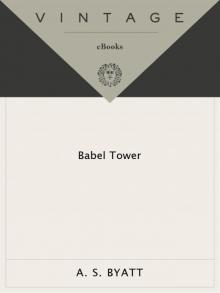 Babel Tower
Babel Tower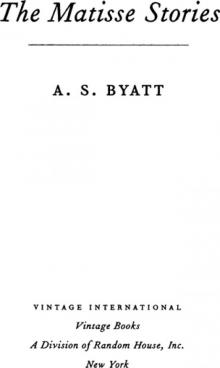 The Matisse Stories
The Matisse Stories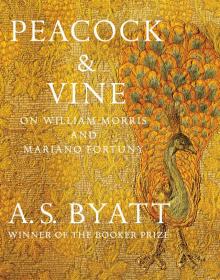 Peacock & Vine: On William Morris and Mariano Fortuny
Peacock & Vine: On William Morris and Mariano Fortuny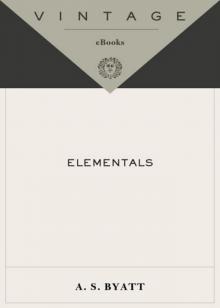 Elementals: Stories of Fire and Ice
Elementals: Stories of Fire and Ice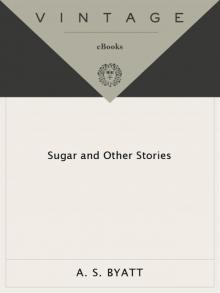 Sugar and Other Stories
Sugar and Other Stories Possession
Possession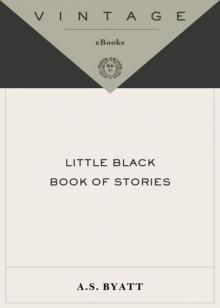 Little Black Book of Stories
Little Black Book of Stories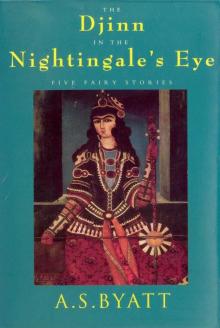 The Djinn in the Nightingale's Eye
The Djinn in the Nightingale's Eye The Virgin in the Garden
The Virgin in the Garden The Game
The Game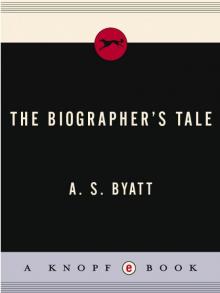 The Biographer's Tale
The Biographer's Tale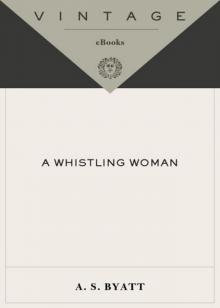 A Whistling Woman
A Whistling Woman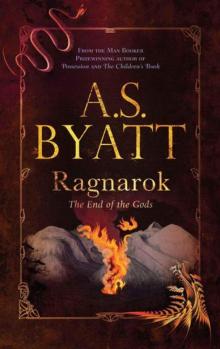 Ragnarok
Ragnarok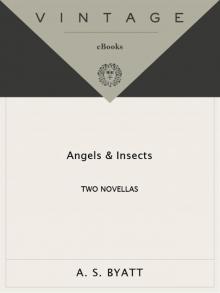 Angels & Insects: Two Novellas
Angels & Insects: Two Novellas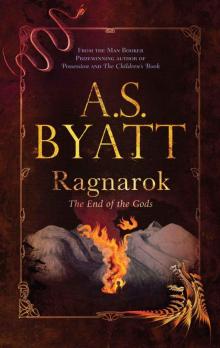 Ragnarok: the End of the Gods (Myths)
Ragnarok: the End of the Gods (Myths)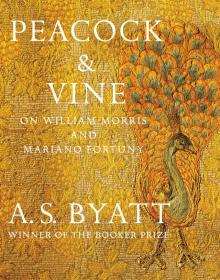 Peacock & Vine
Peacock & Vine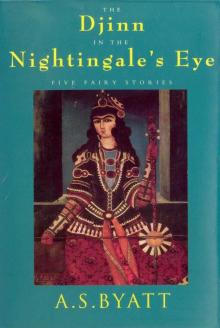 The Djinn in the Nightingale's Eye (Vintage International)
The Djinn in the Nightingale's Eye (Vintage International)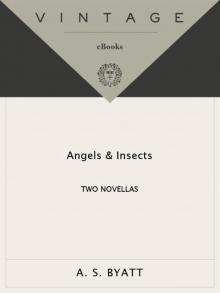 Angels and Insects
Angels and Insects The Arabian Nights: Tales from a Thousand and One Nights (Modern Library Classics)
The Arabian Nights: Tales from a Thousand and One Nights (Modern Library Classics)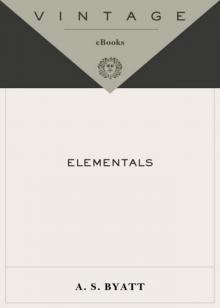 Elementals
Elementals